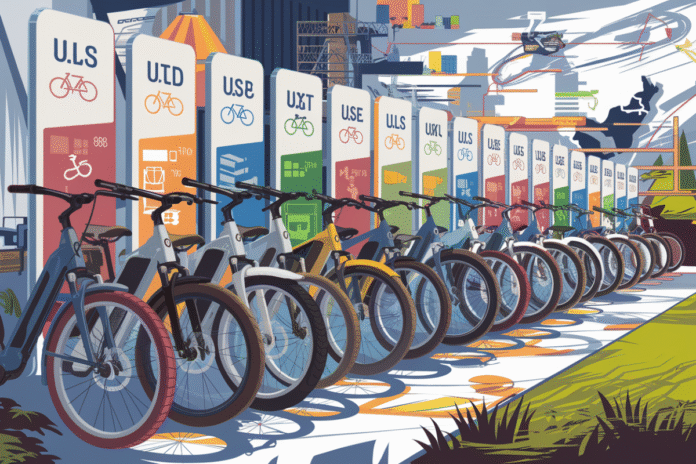“The demand for sustainable transportation is skyrocketing.” As cities grapple with traffic congestion and environmental concerns, the shift towards eco-friendly alternatives has never been more urgent. E-bikes, in particular, have emerged as a popular solution, providing a balance between convenience and sustainability. With the rise of this trend, a new player has entered the American market, aiming to reshape the landscape of personal transportation.
In a country where the e-bike market is projected to grow significantly, the introduction of a company specializing in refurbished e-bikes presents both opportunities and challenges. By offering a more affordable and environmentally friendly option, this company not only caters to budget-conscious consumers but also promotes a circular economy. As the number of e-bikes available for sale reaches into the thousands, the question arises: will this innovative approach to sustainable transport gain traction in the competitive U.S. Market?
The Rise of E-bikes in America
The e-bike market in the United States has witnessed remarkable growth in recent years. According to industry reports, sales of e-bikes surged by over 145% in 2020 alone, fueled by a growing awareness of environmental issues and a desire for alternative commuting options. As urban areas become increasingly congested, many Americans are turning to e-bikes as a viable solution. This shift not only alleviates traffic but also reduces carbon emissions, making it an appealing choice for environmentally conscious consumers.
Several factors contribute to the rising popularity of e-bikes. The convenience they offer, combined with their ability to cover longer distances without the physical strain of traditional bicycles, makes them an attractive option for commuters. Additionally, the COVID-19 pandemic has accelerated this trend, as more people seek to avoid crowded public transportation. With the potential for government incentives and subsidies to promote green transportation, the e-bike market is poised for further expansion.
As the e-bike market continues to grow, it brings both challenges and opportunities for new entrants. Established brands face competition from refurbished e-bike sellers, who offer affordable alternatives. This dynamic could lead to a shift in consumer preferences, as buyers weigh the benefits of purchasing a refurbished model against traditional new e-bikes. The implications for the industry could be profound, potentially reshaping how e-bikes are marketed and sold in the U.S.
Refurbished E-bikes: a Sustainable Choice
Refurbished e-bikes represent a growing segment of the market, appealing to consumers who prioritize sustainability and affordability. By refurbishing used e-bikes, companies can significantly reduce waste and extend the life cycle of these vehicles. This approach not only benefits the environment but also provides a cost-effective option for consumers who may be hesitant to invest in new models.
For instance, a refurbished e-bike can often be purchased at a fraction of the cost of a new one, making it an attractive choice for those looking to enter the e-bike market without breaking the bank. Many refurbished models undergo rigorous testing and repairs to ensure they meet safety and performance standards, providing consumers with peace of mind. As awareness of the benefits of refurbished products grows, more consumers are likely to consider this option.
The implications of this trend extend beyond just individual consumers. By promoting refurbished e-bikes, companies can contribute to a circular economy, reducing the demand for new manufacturing and minimizing environmental impact. This shift in consumer behavior could also encourage traditional manufacturers to explore more sustainable practices, ultimately benefiting the entire industry.
Challenges and Opportunities in the U.s. Market
While the potential for refurbished e-bikes in the U.S. Market is significant, challenges remain. One of the primary hurdles is consumer perception. Many buyers may still be skeptical about the reliability and safety of refurbished products. Overcoming these concerns will require companies to implement transparent quality assurance processes and provide warranties that instill confidence in potential buyers.
Moreover, competition from traditional e-bike manufacturers is fierce. Established brands have strong market presence and loyal customer bases, making it essential for new entrants to differentiate themselves. Innovative marketing strategies, such as highlighting the environmental benefits of refurbished e-bikes and offering exceptional customer service, can help attract consumers.
Additionally, regulatory hurdles may pose challenges for companies entering the refurbished e-bike market. Ensuring compliance with local and federal regulations regarding safety and emissions standards is crucial. However, navigating these challenges also presents an opportunity for companies to advocate for more supportive policies that promote sustainable transportation options.
The Future of E-bikes in the U.s.
The future of e-bikes in the United States looks promising, especially with the growing emphasis on sustainability and reducing carbon footprints. As more consumers become aware of the benefits of eco-friendly transportation, the demand for e-bikes—particularly refurbished models—is likely to increase. Companies that can effectively communicate the value of their offerings and address consumer concerns will be well-positioned to thrive in this evolving market.
Furthermore, advancements in technology and battery efficiency are expected to enhance the performance and appeal of e-bikes. As manufacturers continue to innovate, consumers can look forward to improved features and functionalities that cater to their needs. This evolution will not only attract new buyers but also encourage existing e-bike owners to upgrade their models.
Ultimately, the integration of refurbished e-bikes into the mainstream market could play a significant role in shaping the future of personal transportation in America. By promoting a culture of sustainability and affordability, companies have the potential to transform the way consumers think about mobility, paving the way for a greener and more efficient transportation landscape.


